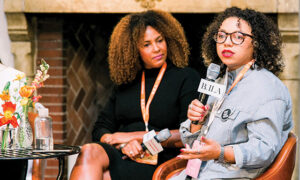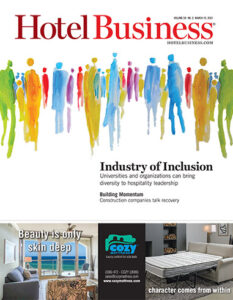Diversity and inclusion in the leadership ranks of the hospitality industry has been an issue since the first hotel opened long ago. And to this day, as brand companies, ownership firms and others have instituted new programs and initiatives, and created new positions to help address the issue, there is still more work to be done.
According to a Castell Project study from last year, 84% of the 630 hotel company websites reviewed did not show Black executives on their websites. It also stated that although Black people make up 17.9% of employees in the hospitality industry, they hold 0.7% of CEO jobs within U.S. hospitality firms. At the director level and above, members of the Black community hold 1.5% of the positions.
There is no doubt that the industry employs many people of color, but those positions are mostly at the property level. There has to be more to it than “that’s the way it has always been.” And there needs to be more to it than that if the industry is to evolve.
Peggy Berg, chair, Castell Project, said she has heard Black parents discourage their children from pursuing hospitality careers, adding, “This is because the Black community understands from personal experience what the statistics show—that the industry has offered limited opportunity for Black people to advance.”
Andy Ingraham, president/CEO, National Association of Black Hotel Owners, Operators and Developers (NABHOOD), was one of those children. “I always go back to my own upbringing. My parents said, ‘Hospitality industry? Absolutely not,’” he noted. “And years later, in talking with my mother, she said, ‘I have not seen anybody—an owner or an executive [of color.]’ Growing up in the Bahamas, she didn’t see any Black general managers. All she saw were the maids, the doormen—the folks not in executive positions.”
Perhaps, an issue is that people of diverse backgrounds have a misconception of what the industry is all about. “So many people equate service with servitude, and that is the mentality that we need to change,” said Donna Quadri-Felitti, Marvin Ashner director/associate professor, School of Hospitality Management at Penn State. “I think that we’re seeing that change because of the pandemic. How important are hospitality businesses? Hotels? Catering venues? Restaurants? Meeting and event venues? All of these are at the heart of every community, whether you are a tertiary city or first-tier city. All of them are important to the cultural identity of a place, as well as the economic engine of many.”
But, as Ingraham noted, “whether it’s the management companies, the ownership companies, the finance companies or the development companies, it’s very seldom that you see people of color.”
He added, “That has a huge impact on who the next generation of leaders are going to be because most young people will look around in their community, and their circle is not going to revolve around young real estate and financial moguls. A lot of them go into entrepreneurship because a lot of them feel they can be more successful pursuing that than working in a corporate structure.”
Greg DeShields, executive director of the newly formed Tourism Diversity Matters, an organization dedicated to inspiring authenticity and inclusive leadership throughout the tourism and events industry, pointed out that the talent is out there.
“There is, without any doubt, an aspiration for people of color to pursue careers in this industry,” he said. “It’s an incredible industry. But, I think that there’s been a challenge in this industry to recognize and evolve that talent at the depth which it should, in terms of showing greater diversity, not just at supervisory managerial levels, but at the leadership level. Moving them up into president and CEO levels, there seems to be a challenge with that. But, I can say without any question, that the desire and the talent pool is there.”
But diversity and inclusion issues aren’t just about people of color. Women have also found it difficult to climb up the ladder in the industry. Castell Project reported last year that women held only 12% of hospitality industry leadership positions in 2019. Another study released last month found that public hospitality companies and the Russell 3000 financial index average just 23% women board members.
Berg has found that most of the female hospitality executives can be found in the human resources department. “HR allows women to advance, so HR attracts more talented women,” she said. “HR also is where diversity executives are housed, so in a company with few Black executives, at least one is likely to be an HR role. Where women can advance, such as HR and marketing, they do well and gain share to the benefit of their companies. Sectors where women have been stymied, including finance and brokerage, still have little access to half the talent pool.”
Owner-operator McNeill Hotel Company is an example of one hospitality firm that has diversity as one of its core values. Of 73 managers with the titles of director of sales, sales manager, general manager, assistant general manager or operations manager, 30—or 41%—identify as a race other than white. Also, of these 73 individuals, 45 are female, making 62% of McNeill managers female.
“We live in a diverse nation and society, and our industry gains when it reflects that reality, which includes the guests we serve,” said Mark Ricketts, president/COO, McNeill Hotel Company. “A diverse workforce and executive team offer perspectives different from that with which any single one of us may be familiar. It brings more voices and objectivity to the table. As Omari Head, founder of the National Institute of Lodging Education, a nonprofit focused on educating Black and Latinx audiences about hotel ownership, noted recently, research indicates that diverse and inclusive organizations achieve enhanced performance. Also, the more diverse we are, the better we will be able to attract new people to our company and industry. This is extremely important as we emerge from this pandemic.”
So, how can the industry find and mold the next generation of hospitality executives and make the pool as diverse as the people it serves?
“Recognizing there was and is a lack of diversity is the first step toward remedying this problem and, having largely done that as an industry, we are working toward solutions,” said Cecil Staton, president/CEO, AAHOA. “Scouting and recruiting a wide range of talent, especially among those who came up in the hospitality industry, is key to addressing this issue. Highlighting the opinions, perspectives and experiences of minorities and women by bringing greater diversity to panels, moderators, etc., at industry conferences is an excellent way to communicate the value of inclusion.”
He continued, “The industry relies on workers from a number of fields such as IT, marketing, accounting, management and finance to operate. Helping prospective talent outside of hospitality understand there is more to the industry than what they see in the front of the house can help bring greater diversity to the field. Hospitality is a great career with numerous opportunities for advancement. Many industry leaders worked their way up from entry-level positions. As an industry, we need to help the next generation of workers and leaders realize the potential in hospitality careers.”
Chris Green, president/CEO, Chesapeake Hospitality, pointed to something a client shared with him: “What gets focus gets done.” He added, “That’s simply it. As a holistic industry committed to change, opportunity for all cannot be something that we only say. It must be an agenda item…with defined actions and targets.”
Advancing through education
The Penn State School of Hospitality Management is attempting to capture future hospitality leaders from diverse backgrounds right out of high school through a project known as Creating Opportunities for Young Hospitality Leaders [COYHL].
“We will be piloting a high-school bootcamp for students from underrepresented populations to discover hospitality,” said Quadri-Felitti. “We’re really eager to work with a few of our high school partners to not only bring students to our industry through education and through our facilities here at Penn State, but inspiring them to that leadership pathway, showing them that ownership and leadership can be attainable.”
She continued, “We also want them to see how diverse this industry is, and we want to learn from those high school students about what their perceptions are. As we go through this high school program, we hope to not only inspire young people, but also learn from them of what’s holding them back from joining all the successful folks who are in this business.”
Another initiative that’s for School of Hospitality Management students is the HM People Project, which, according to Quadri-Felitti, “is about looking at industry opportunities to change the landscape in our thinking through research; training and education; webinars and dialogue; and thought leadership. It’s about how we can serve our profession to be better.”
In the works is the Collaboratory for Inclusion and Innovation, a 12,000-sq.-ft. historic building
about 200 yards from the building housing the School of Hospitality Management. “The idea is to put experiential learning in hospitality, events, beverage management and our food decision research laboratory together with doctoral students researching the phenomenon [of inclusion], but also to create a place where diversity of skills come together and can play, learn and innovate together,” said Quadri-Felliti. “So, it really is like that ‘people project’ idea of we’re going to come at it with a 360-degree approach—recruiting, teaching, empowering, researching and disseminating that research in an experiential lab kind of way.”
But whatever the initiative, any institute of higher learning’s ultimate goal is to prepare all students for a career in hospitality that is as rewarding as it is fruitful.
As Quadri-Felitti put it, “We can fund scholarships for underrepresented students. We can create to-do programs for students who have diverse and different challenges or backgrounds. We can do research into what stops us [from being inclusive]and how to fix that, and we can teach more inclusively. We can be more self-aware and do training that makes us more self-aware, and on and on. But we have to do all of it with the same commitment and intentionality.”
Helping women advance in hospitality
Two organizations have focused their efforts on helping women find a place in the hospitality industry—the Castell Project and the Boutique Lifestyle Leaders Association (BLLA).
Castell@College is an initiative of the Castell Project in which female executives share real-life stories of opportunities, challenges and rewards of a hospitality career with the goal of strengthening students’ interest in the industry and its career opportunities. In 2021, 1,800-2,000 hospitality students on the verge of launching their hospitality career are expected to take part in the seminars offered by Castell@College.
“Even within college hospitality programs, students tend to select concentrations other than hotels,” said Castell Project’s Berg. “We address two underlying causes. First, some women have been given the idea that they must choose between a family and a career in our industry. Not surprisingly, our industry loses. Instead, our panels show young women that strong careers in hospitality deliver strong resources to families.”
She continued, “Second, students seldom understand the range of exciting career paths in the industry. Every Castell@College panel demonstrates a wide range of hospitality careers, from operations to asset management to myriad other paths—opening students’ eyes and their imaginations. Our panels also are racially diverse so students can see executives who look like themselves. Our roster includes more than 120 female executives and delivers an exciting invitation to the industry personalized for the remarkably diverse students we meet.”
BLLA makes a point of filling its conference sessions with 50% women. “We focus on equal opportunities in our industry and strive to give a voice to everyone, specifically those with small businesses in our industry and leaders who may be unknown currently,” said Ariela Kiradjian, partner/COO, BLLA. “We give them that first stage opportunity.” BLLA hosts a number of events each year, one of them is the Women in Travel and Hospitality Conference, which, Kiradjian noted, was the last in-person gathering the organization held in 2020.
“There’s just something about gathering an intimate group of women who all want to support one another,” she said. “Discussions revolve around women’s education and empowering them with support while offering an open forum for ideas and future programs to support phenomenal opportunities in our industry. Our goal is to literally help change the lives of women while supporting their own personal-growth initiatives.”
Kiradjian’s mother, BLLA founder/CEO Francis Kiradjian, also founded the Travel Industry Executive Womens Network, a group of more than 12,000 women globally that form connections both online at LinkedIn and offline through conferences and events.
“These women join because they desire a home to connect with along their journey,” said Ariela Kiradjian. “Many of the members have spent their entire lives in the travel, tourism and hospitality sectors and are keen on leaving a legacy behind for those just beginning their own stories. Every group has mentors helping their members, but it seems that this network has more members with many years of experience and the openness to freely discuss them with other women in our industry.”
AAHOA does its part
Although there is not a lack of Asian-American executives in the industry, AAHOA was founded in response to discrimination Asian-American hoteliers faced by lenders, insurers, vendors and brands, according to Staton.
“Asian-American hoteliers, as well as other racial minorities and women, had to prove they were capable entrepreneurs because, traditionally, they were not part of the power structures that defined many companies, financial institutions and government,” he said.
Today, AAHOA is the largest hotel owners association in the world with more than 19,500 members. The organization is constantly working to recruit and educate the next generation of hoteliers.
“AAHOA partners with and funds scholarships at universities that have renowned hospitality programs such as the University of Houston and Kennesaw State University,” Staton said. “It is open to all hoteliers and anyone with an interest in owning a hotel. The resources available through AAHOA Hotel Owners Academy, including the Certificate in Hotel Ownership (CHO), can help any hotel owner or prospective owner learn how to build their business. AAHOA also hosts numerous events and focus groups for young professional hoteliers and women hoteliers.”
The organization also hosts numerous brand development days, which allow hoteliers to meet with brand executives and help them learn about what it takes to work with some of the most prestigious flags in the industry.
“AAHOA designates several of these for young professional hoteliers and women hoteliers to ensure that these traditionally underrepresented groups have opportunities to network and discuss development opportunities,” said Staton. “It has a successful mentor match program which offers unique professional development opportunities to aspiring hoteliers and hospitality industry professionals. AAHOA also works closely with organizations such as Castell Project and She Has a Deal to support the important work they do on behalf of women hoteliers and our entire industry.”
He also noted that AAHOA is a community with an extensive network of hoteliers who are “committed
to paying it forward and offer many opportunities for those who want to enter the hospitality industry,” and added that it “remains committed to the principles of our founding so that every hotelier has equal opportunities to create their own success.”
Tackling the diversity issue
Talent recruitment platform Jobvite recently launched a free Job Description Grader tool that analyzes racial and gender bias, insensitive word use, readability and sentiment to create more inclusive job postings.
Brianne Thomas, Jobvite head of recruiting, believes that the lack of diversity in the hospitality industry is an issue of recruitment.
“There’s a big opportunity to cultivate a talent pipeline through diversity-focused candidate experiences,” she said. “This can be accomplished by first assessing and understanding your current employee base. What does diversity look like in each department? How does it change depending on title and level within the company? You should also take a look at the rate of promotions and pay equity. Then, it’s time to attract and hire. This can include reviewing job descriptions for biased language, publishing diversity and inclusion content on your career site and social media, and de-identifying resumes to reduce bias.”
According to Thomas, the Job Description Grader by Jobvite helps talent acquisition professionals target the areas where bias appears in job postings, allowing them to adjust and present more inclusive descriptions. The tool helps talent teams strategically build a more diverse pipeline of talent.
“The complimentary tool uses AI, analytics and benchmarking—combined with current best practices in diversity and inclusion—to review job descriptions, uncover unconscious bias and make recommendations for more inclusive language,” she said. “The result is more high-quality applicants and a shorter time-to-hire. When you need to hire a lot of people in a hurry, which might become the case as many hospitality groups look to rebuild their workforces as things start to reopen in the months ahead post-pandemic, reaching the best candidates is critical.”
The aforementioned Tourism Diversity Matters was recently launched to be a resource to foster diversity, equity and inclusion practices that will educate, advocate, engage and empower in collaboration and cooperation with all tourism industry initiatives, according to cofounders Mike Gamble, president/CEO of SearchWide Global, and Elliott Ferguson, president/CEO of Destination DC.
“The intention is to not replace existing good work happening in this area, but rather to shine a light on it, and add value and insight where needed,” said Gamble.
Ferguson, who recently served out his term as chair of the U.S. Travel Association, knows there’s work to be done. “If you look at the industry as a whole and pick out, say, a thousand team leaders and employees, and you will clearly see diversity,” he said. “But what you don’t see is diversity as you look at the higher levels of the [organizational]pyramid. So, there’s diversity within the industry, but there’s not enough diversity within the leadership rungs, and that is something in which we’re all focusing on as we’re looking at moving this in the right direction.”
The group is based around four guiding pillars: apprenticeship programs; workforce development; diversity, equity and inclusion (DEI); and research and data.
“The apprentice program [created by SearchWide Global]is a well-established program that is a perfect vehicle in terms of creating access and opportunities for diverse candidates,” noted executive director DeShields, who also leads PHL Diversity, a division of the Philadelphia Convention & Visitors Bureau. “The workforce development pillar will certainly be important as we look at the future of our industry, and our efforts to re-employ and employ new people.”
The road ahead
The pieces are in place for the next generation of leaders in this industry to be a group of diversity, equality and inclusion. From the brands to the universities to the industry organizations, everyone can work together to make it a career for all because, in the words of Penn State’s Quadri-Felitti, “There is so much compassion in people who work in our industry, and we have the power to make a difference. If civility and inclusion were ever in the ethos of business, it’s in what we do.”
To learn more about diversity and inclusion initiatives, and programs that address them, stay tuned for an upcoming Hot Topics virtual session, scheduled for April.




